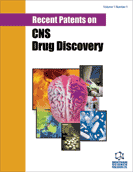Abstract
Accumulation of Aβ peptide in the brain results in the formation of amyloid plaques characteristic of Alzheimers disease (AD) pathology. Aβ soluble oligomers and protofibrils are neurotoxic and these are believed to be a major cause of neurodegeneration in AD. Aβ is derived from a precursor protein by two sequential cleavage steps involving β- and γ-secretases, two proteolytic enzymes that represent rational drug targets. β-secretase was identified as the membrane-anchored aspartyl protease BACE (or BACE1) and found to be elevated in brain cortex of patients with sporadic Alzheimers disease. In this review, we summarize current approaches towards the development of BACE inhibitors with focus on bioactive compounds and related patents. Recent reports have described drugs that are effective at inhibiting Aβ production in the brain of transgenic mouse models. The beginning of Phase I clinical trials has been approved for one of them and we can expect that in the near future BACE inhibitors will provide novel effective therapeutics to treat AD.
Keywords: Alzheimer's disease, β-secretase, BACE1, inhibitors, aspartyl protease, Aβ amyloid
 17
17





















